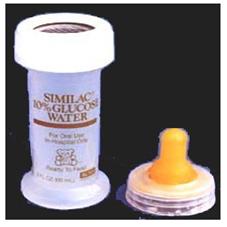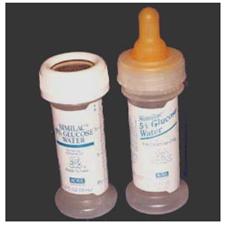신생아 탈수 열
Dehydration fever of newborn infants
신생아 탈수 열의 원인
- 감염병도 앓지 않고 열이 나게 하는 다른 병도 없는데 신생아가 수분을 충분히 섭취하지 못해 탈수 되고 탈수로 인해 생긴 열을 신생아 탈수 열이라 한다.
- 신생아에 탈수 열이 있으면 미열 내지 고열이 날 수 있다.
- 신생아 탈수 열은 생후 2~3일경에 나는 것이 보통이다.
- 탈수 열은 모든 신생아들에게 날 수 있지만 모유를 먹는 신생아들에게 더 잘 날 수 있다.
[부모도 반의사가 되어야 한다-소아가정간호백과]-제21권 소아청소년 가정 학교 간호-고열이 날 때, 체온, 신생아에게 열이 날 때, 미숙아 체온 조절, 신생아가 열이 나면 어떻게 하나요, 열이 날 때 참조.
신생아 탈수 열의 증상 징후
- 생후 첫 2~3일 동안 대부분의 수유모는 젖 먹는 신생아가 그날그날 필요로 하는 양의 젖을 충분히 분비할 수 없다.
- 모유가 충분히 분비되지 않거나 그 외 다른 이유로 모유나 인공영양을 충분히 섭취할 수 없는 신생아는 탈수될 수 있다.
- 탈수 열이 탈수된 신생아에게 날 수 있다.
- 실내 온도가 보통 이상으로 높거나 보육기 내 온도가 고온일 때 신생아가 탈수될 수 있고 탈수 열이 날 수 있다.
- 탈수 열이 나면 신생아는 보채고 불안해 보인다.
- 심장 박동과 숨결이 빨라진다.
- 신생에게 그런 증상 징후가 있어도 많이 아파보이지 않는다.
- 탈수 열이 있는 신생아에게 신생아 용 무균 식수나 신생아용 5% 포도당 액(사진 113, 114 참조), 또는 인공영양을 먹이면 갈증이 난 듯 급히 잘 빨아먹는 것이 보통이다.
- 탈수 열이 있는 신생아에게 신생아용 무균 식수나 5% 포도당물 등을 충분히 먹이면 신생아 탈수 열은 바로 떨어진다.
- 탈수 열이 있는 신생아는 그렇게 많이 아픈 것처럼 보이지 않는 것이 신생아 탈수 열의 특이한 증상 징후이다.
신생아 탈수 열의 진단
- 병력 증상 징후 진찰소견, 혈액 검사, 피 소변 대변 등의 피검 물로 세균 검사를 해서 그 결과를 종합해서 진단한다.
- 신생아의 생명에 위험한 감염병을 앓을 때도 탈수 될 수 있고 미열내지 고열이 날 수 있다.
- 그 때문에 확실한 진찰 진단을 받지 않고 신생아에게 탈수 열이 난다고 조급하게 진단해서는 안 된다.
신생아 탈수 열의 치료
- 신생아 탈수 열이 모유를 먹는 신생아에게 생기면 모유를 계속 먹인다.
- 수유모는 신생아에게 젖을 더 충분히 먹이기 위해 정신적으로 육체적으로 휴식을 충분히 취하고 음식물을 더 충분히 섭취해야 한다.
- 신생아 탈수 열은 신생아용 5% 포도당물이나 무균 식수를 2~3시간마다 몇 시간 동안 충분히 먹이면 열이 곧 떨어진다.
- 신생아 탈수 열은 인공영양을 먹는 신생아에게도 날 수 있고 탈수 열이 생기면 보통 때와 같이 계속 인공영양을 먹여도 된다.
- 실내 온도나 보육기 내 온도를 적당히 조절하고 너무 덥지 않게 옷을 입히고 덮어준다.
- 신생아가 패혈증, 뇌막염, 또는 그 외 생명에 위험한 감염병을 앓을 때도 신생아에게 미열내지 고열이 날 수 있고 탈수될 수 있다. 그런 감염병과 신생아 탈수 열을 감별 진단해야 한다.
- 신생아에게 미열내지 고열이 나면 무조건 의사에게 곧 문의하고 의사의 진단 치료를 받아야 한다.
- 태어난 후 모유 수유를 바로 시작하거나 인공영양을 먹이고 신생아용 5% 포도당 물이나 신생아 용 무균 식수를 먹이면서 신생아를 적절히 잘 양육하기 때문에 요즘 신생아 탈수 열이 잘 생기지 않는다.

사진 113.탈수되고 열이 나면 신생아용 포도당 액을먹인다.
Copyright ⓒ 2013 John Sangwon Lee, MD., FAAP

사진 114.탈수되고 열이 나면 신생아용 포도당 액을 먹일 수 있다.Copyright ⓒ 2013 John Sangwon Lee, MD., FAAP
Dehydration fever of newborn infants 신생아 탈수 열
Causes of dehydration fever in newborns
- There are no infectious diseases and there are no other diseases that cause fever,
- but newborns are dehydrated because they do not drink enough fluids, and the fever caused by dehydration is called newborn dehydration fever.
- Dehydration fever in newborns can lead to mild to high fever.
- Dehydration fever in newborns usually occurs around 2 to 3 days of age.
- Dehydration fever can fly to all newborns,
- but it can be better for those who are breastfed.
- [Parents should also be at least the half-doctors-Pediatrics and Family Nursing Encyclopedia]-Volume 21 Child and Adolescent Home School Nursing- High fever, body temperature, fever in newborns, body temperature control of premature infants, what to do if newborns have fever.
Signs of symptoms of dehydration fever in newborns
- During the first 2-3 days of life, most nursing mothers are unable to produce enough milk for the day-to-day needs of a nursing newborn.
- Newborns who do not produce enough breast milk or for other reasons unable to consume enough breast milk or artificial nutrition can become dehydrated.
- Dehydration fever can fly to dehydrated newborns.
- When the room temperature is unusually high or the temperature in the incubator is high, the newborn may become dehydrated and may develop a dehydration fever.
- When a child has a dehydration fever, the newborn looks nervous and anxious. Your heart beats and breathes faster.
- Even if the newborn has signs of such symptoms, it doesn’t look like much pain. Newborns with dehydration fever are usually fed sterile drinking water for newborns, 5% glucose solution for newborns (see pictures 113 and 114), or artificial nutrients, so that they suck well as if thirst.
- If a newborn baby with dehydration fever is fed enough sterile drinking water for newborns or 5% glucose, the newborn’s dehydration fever immediately drops. Newborns with dehydration fever do not appear to be so ill, which is a peculiar symptom of neonatal dehydration fever.
Diagnosis of dehydration fever in newborns
- Medical history Symptoms Symptoms, examination findings, blood tests, blood, urine, stool, etc. are tested for bacteria and the results are synthesized and diagnosed. Even when suffering from an infectious disease that is dangerous to the life of a newborn,
- it can lead to dehydration and a mild to high fever.
- For that reason, you should not be impatiently diagnosed as having dehydration fever in a newborn without receiving a definite medical examination.
Treatment of dehydration fever in newborns
- If newborn dehydration fever develops in a breastfed newborn, continue breastfeeding. Nursing mothers need to get enough mental and physical rest and eat more food in order to feed their newborn baby more fully.
- Dehydration fever for newborns will soon drop if a newborn is given 5% glucose or sterile drinking water every 2 to 3 hours for several hours.
- Dehydration fever in newborns can also fly to newborns who are fed artificial nutrition, and if dehydration fever develops, they can continue to feed artificial nutrition as usual. Adjust the room temperature or the temperature in the incubator appropriately, and dress and cover it so that it is not too hot.
- Even when a newborn has sepsis, meningitis, or other life-threatening infectious diseases, the newborn can have a mild to high fever and can become dehydrated. Such infectious diseases and neonatal dehydration fever should be differentially diagnosed.
- If your newborn has a mild or high fever, you should immediately consult a doctor and seek medical attention.
- Newborn dehydration fever does not occur these days because they start breastfeeding immediately after birth or feed artificial nutrition and feed them with 5% glucose for newborns or sterile drinking water for newborns

Picture 113: When dehydrated and feverish, the newborn is given a glucose
solution for newborns. Copyright ⓒ 2013 John Sangwon Lee, MD., FAAP

Photo 114: If you are dehydrated and have a fever, you can feed the newborn’s
glucose solution. Copyright ⓒ 2013 John Sangwon Lee, MD., FAAP
출처 및 참조문헌
- Red Book 29th Edition, American Academy of Pediatrics
- Harriet Lane Handbook 19th ed
- Nelson Pediatric Textbook 19th ed.
- MMWR
- CDC
- 그 외
Copyright ⓒ 2015 John Sangwon Lee, MD., FAAP
“부모도 반의사가 되어야 한다”-내용은 여러분들의 의사로부터 얻은 정보와 진료를 대신할 수 없습니다.
“The information contained in this publication should not be used as a substitute for the medical care and advice of your doctor. There may be variations in treatment that your doctor may recommend based on individual facts and circumstances. “Parental education is the best medicine.”
Copyright drleepediatrics.com 2/16/2026